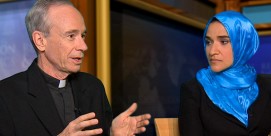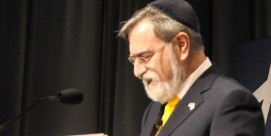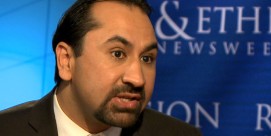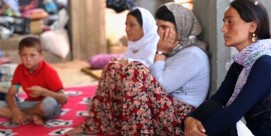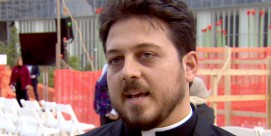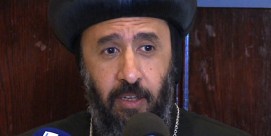Shanksville One Year Later
LUCKY SEVERSON, guest anchor: As the nation gears up for the one-year anniversary of September 11, there’s already been a barrage of media coverage from ground zero and the Pentagon — and comparatively little from Shanksville, Pennsylvania. Shanksville is the small southern Pennsylvania town where the fourth hijacked plane crashed after taking off from Newark. The “Let’s Roll” heroism of the passengers aboard Flight 93 inspired the nation, but few Americans know of the profound spiritual impact of 9/11 on the rural community where the plane went down. Kim Lawton has our special report from Shanksville.
KIM LAWTON: It’s supposed to look like Jerusalem during the time of Jesus, but it’s really Shanksville, Pennsylvania in the year 2002. The churches in town are sponsoring a communitywide Bible school. Local kids are learning about the life and times of Jesus … and for a while, forgetting about the tumultuous times of their own town over the past year.
It’s been nearly 12 months since United Flight 93 slammed into a strip-mined field just outside Shanksville, killing all 44 people aboard and shattering the peaceful existence of this remote rural community.
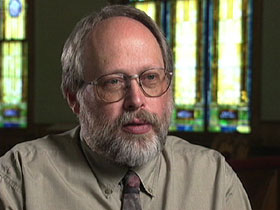 Rev. RON EMERY (Shanksville United Methodist Church): All we knew was that something terrible had happened to the nation, and we were part of it. And the community was sort of in shock and disbelief. Who would’ve ever thought on national news that you would’ve heard the words “New York City,” “Washington, D.C.,” and “Shanksville, Pennsylvania” in the same sentence?
Rev. RON EMERY (Shanksville United Methodist Church): All we knew was that something terrible had happened to the nation, and we were part of it. And the community was sort of in shock and disbelief. Who would’ve ever thought on national news that you would’ve heard the words “New York City,” “Washington, D.C.,” and “Shanksville, Pennsylvania” in the same sentence?
LAWTON: But Shanksville is irrevocably tied to the horror of September 11. The fourth hijacked plane crashed on the edge of a wooded grove here at a speed of more than 500 miles per hour, burrowing a crater nearly 30 feet deep and scattering debris for miles. Less than 10 percent of the human remains were ever recovered.
Today, the crater has been filled, and a flag marks the spot where the plane went down. Access to the crash area is still restricted, but thousands of visitors have been coming to a temporary memorial on a hill overlooking the site. And Shanksville itself continues to deal with the impact of the unthinkable.
Shanksville was founded in the late 1700s, and local residents say it’s always been pretty much what it is now: a close-knit community with a school, a post office, a general store, and seven churches — all of them Protestant.
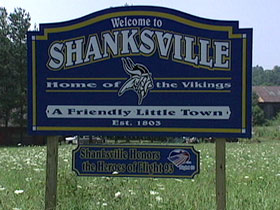 The population here stands at 245. Many residents live on sprawling farms down country lanes. It’s a quiet place, where it’s not unusual to see an Amish buggy riding down Main Street. It was a largely isolated community — until last September.
The population here stands at 245. Many residents live on sprawling farms down country lanes. It’s a quiet place, where it’s not unusual to see an Amish buggy riding down Main Street. It was a largely isolated community — until last September.
On a sunny morning shortly before 10 a.m., Flight 93 crashed just behind Clara Hinton’s home, where she and her husband lead a Churches of Christ house church.
CLARA HINTON: Actually, the plane went down as you look right into the woods. Here, it’s almost directly straight through these woods here, less than a mile.
We lost our innocence the day 9/11 occurred. And by that I would say we kind of were not even a spot on the map, and now, when you mention Shanksville, we’re a spot on the map. Before, we didn’t even know if we were connected, kind of, to the rest of the world.
LAWTON: Now, the world is rumbling in, and the crash site has become a place of pilgrimage, a shrine on sacred ground.
Rev. ROBERT WAY (St. Mark Evangelical Lutheran Church): That is a cemetery, in the form of cremation. The majority of bodies have not been exhumed from that area. They’re dust that is still surrounding that area, so that is a cemetery. We treat that that way.
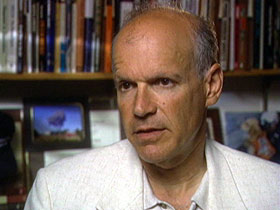 LAWTON: So far, there are no definitive plans for a permanent memorial. Congress, the U.S. Park Service, the county, the town, and family members of the victims have been discussing possibilities. Religion professor Edward Linenthal is a consultant with the National Park Service on historic sites.
LAWTON: So far, there are no definitive plans for a permanent memorial. Congress, the U.S. Park Service, the county, the town, and family members of the victims have been discussing possibilities. Religion professor Edward Linenthal is a consultant with the National Park Service on historic sites.
Prof. EDWARD LINENTHAL (University of Wisconsin, Oshkosh): Memorial issues are almost, by definition, razor’s-edge issues. It’s burial places for people, and yet it also is part of the national landscape. What does it mean to call a place sacred ground? How do you deal equitably with the landowners?
LAWTON: While the discussions continue, local residents have acted.
Prof. LINENTHAL: The townspeople in Shanksville and surrounding Shanksville see themselves, I think, as moral stewards of this site and feel very strongly that they have to preserve, protect, guard this site for the family members.
LAWTON: Donna Glessner was born in Shanksville and attends the United Methodist church. She organized local church volunteers to be “ambassadors” at the site to provide information and answer questions.
DONNA GLESSNER: It’s our responsibility to make sure it isn’t commercialized and that it retains its sacred character. It’s really a cemetery down there.
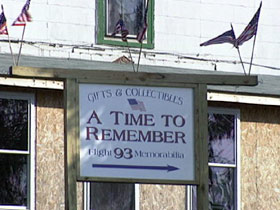 LAWTON: But some commercial activities are already springing up — something that troubles many here. A few miles out of town, a Catholic priest from Altoona is turning an old abandoned church into a Flight 93 memorial chapel. He says it will be a nonsectarian place of prayer, but some locals fear it will turn into a commercial venture. And they worry about who else may be moving in.
LAWTON: But some commercial activities are already springing up — something that troubles many here. A few miles out of town, a Catholic priest from Altoona is turning an old abandoned church into a Flight 93 memorial chapel. He says it will be a nonsectarian place of prayer, but some locals fear it will turn into a commercial venture. And they worry about who else may be moving in.
Rev. ROBERT WAY: The last thing we want is McDonald’s, Burger King, Hyatt Regency, any of that to kind of infiltrate, to become a part of what this community is not.
LAWTON: There’s also a sense of protectiveness for the victims’ families. Many here have established close relationships with them, even opening their homes. Dave McCall is a retired school counselor who was a volunteer “spiritual caregiver” to the families in the days immediately after 9/11. With their permission, he’s written a book about it. Profits will go to a charitable trust.
DAVE MCCALL (Author, FROM TRAGEDY TO TRIUMPH): Some were just in shock. Some people needed us to listen; some needed us to maybe say a kind word. So I guess I just asked the Lord each morning, just keep me open to your needs and show me and tell me what to do.
LAWTON: Many in Shanksville say the tragedy in their backyard has left a deep spiritual impact.
Ms. HINTON: It made us very aware, it made me on a personal level very aware that things, bad things do happen, even here; that yes, evil does exist in this world and evil does occur, and evil occurred right less than a mile from our home.
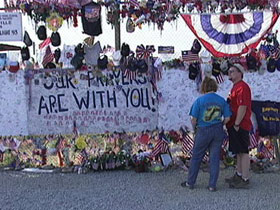 Ms. GLESSNER: We’re not — at least I’m not — versed in world events, and religious tensions in the Middle East. And you know, for me to understand that there is this kind of evil in the world, this kind of hatred? I didn’t know that kind of hatred existed.
Ms. GLESSNER: We’re not — at least I’m not — versed in world events, and religious tensions in the Middle East. And you know, for me to understand that there is this kind of evil in the world, this kind of hatred? I didn’t know that kind of hatred existed.
LAWTON: In the past few months, local ministers have seen an increase in requests for pastoral counseling. They say the tragedy doesn’t appear to have threatened people’s faith, but it has raised difficult spiritual questions about the nature of God, and about good and evil. Questions with no easy answers.
Rev. EMERY: If it wasn’t for God, I would’ve never gotten through most of these situations. It’s been very draining. It’s probably the most challenging thing I’ve ever had to come up against in my life. And I just pray to God that these decisions that I’ve made have been the right ones.
LAWTON: Some experts worry about the long-term impact of 9/11.
Prof. LINENTHAL: I remain skeptical that healthy human communities can be built on piles of murdered bodies. I think the corrosive effects of these events, I think that the toxic impact of these events are enduring.
LAWTON: But people in Shanksville say some good has emerged. Lutheran minister Robert Way moved here just 42 days before the crash. He’s a construction worker-turned-pastor, and this is his first church assignment.
Rev. WAY: I honestly do not believe that the people of this area would have welcomed me as openly as they have already, had it not been for the flight. I think it has really framed what my ministry has been, but also has opened not only myself to them but their lives to me. And that’s been the greatest blessing.
LAWTON: Over and over again, people here say they’ve seen the hand of God at work.
Ms. HINTON: I believe God had a lot to do with the timing of that plane, and where — it if had to go down — where it went down, where not another soul was harmed or hurt. That strengthened my faith so much, it’s incredible.
Ms. GLESSNER: Some people have said that they thought God directed the plane to this place. I don’t know if I’m willing to go that far because I think that was evil at work. But [I] think once the plane crash occurred here, the people that had to take responsibility for various tasks were empowered to do the right thing.
LAWTON: There is concern here that Shanksville has become too defined by the crash of Flight 93. Many hope after the one-year anniversary, things may return more to normal. But no one knows exactly what normal means anymore in a place forever altered by the events of 9/11.
I’m Kim Lawton in Shanksville, Pennsylvania.

